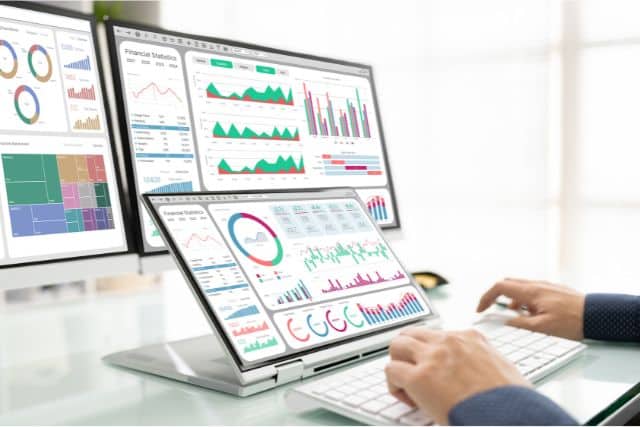Managing operations, tracking expenses, staying compliant, and keeping stakeholders informed are major challenges for commercial real estate landlords. The right property management software can make those tasks far easier to handle.
QuickBooks Online remains one of the most trusted accounting and widely used platforms for small and mid-sized businesses. But to maximize the value of QuickBooks in the real estate world, it’s crucial to pair it with property management software that complements its strengths and fills in the gaps.
In this guide, we’ll take a look at some of the best tools that work with QuickBooks. These solutions help create a more efficient and connected system for managing both your finances and property operations.
Why Use QuickBooks for Property Management?
Many real estate professionals use QuickBooks to manage their finances. They appreciate its easy interface, strong reporting tools, and cloud access. However, when it comes to core property management tasks such as tracking leases, handling maintenance requests, and communicating with tenants, QuickBooks falls short on its own.
That’s where property management software makes a huge difference. These tools help close operational gaps. They sync financial data directly to your QuickBooks Online account, which eliminates double data entry and improves accuracy.
Top Property Management Software to Use with QuickBooks
STRATAFOLIO
STRATAFOLIO is a leading commercial real estate software that helps commercial real estate owners and managers track assets, finances, operations, and investors from a single platform. Its seamless, bi-directional QuickBooks integration delivers powerful analytics through interactive dashboards, utilizing both historical and real-time data. Key features include automated common area maintenance (CAM) reconciliation, lease escalations, ACH payments, document management, and a tenant portal.
Finance Management: STRATAFOLIO consolidates financial data across multiple QuickBooks companies. This offers a global or granular view of payroll, expenses, rental income, debt, and cash flow through centralized dashboards.
Asset Management: Users can track properties, rental income, square footage, and key documents all in one place. The platform also includes tools for managing rent rolls, work orders, and tenant communications. It also tracks certificates of insurance (COI) for each tenant and automatically notifies you of any changes.
Operations Management: The program automates routine tasks, such as lease escalations, CAM reconciliation, invoicing, reminders, and work order tracking. This automation helps reduce errors and save time.
Investor Management: The system gives a clear view of investor activity. It has tools to track investments, returns, and guarantors across different entities.
Many users highlight STRATAFOLIO’s broad functionality, smooth onboarding process, and time-saving features, making it the top choice for managing commercial real estate portfolios.
Buildium
Buildium is a software solution designed for residential-first property managers and real estate professionals, streamlining accounting, leasing, maintenance, and communication.
It comes packed with features that make property management a breeze. You can collect rent online, pay vendors, e-file 1099s, and manage your bank accounts securely, all from one platform. Both tenants and owners get their own easy-to-use portals, making communication and payments simple. Leasing is just as straightforward, thanks to online applications, eSignatures, and thorough tenant screening. Plus, its integration with HappyCo makes mobile inspections and maintenance tracking faster and more efficient.
Acquired by RealPage in 2019 for $580 million, Buildium targets the small to mid-sized property management market. Users praise its intuitive interface, robust feature set, built-in communication tools, and responsive support.
However, some reports indicate that extra fees for certain features can increase costs. Drawbacks include limited third-party integrations, no direct integration with QuickBooks, a less capable mobile app, and restricted customization options for reports and templates.
AppFolio Property Manager
AppFolio Property Manager is a versatile platform built for all kinds of properties, whether you manage multifamily units, single-family homes, commercial spaces, affordable housing, or student apartments. It comes packed with powerful tools for accounting, reporting, and tracking real-time financial data. You may also control CAM tracking, online payments, and interface through its configurable API. Maintenance-wise, AppFolio makes life easier with intelligent bill entry, online work orders, mobile inspections, and easy unit turnboards to keep things moving continuously.
AppFolio helps businesses grow with assignable user roles, audit logs, dashboards, performance insights, and strong integration capabilities for scalability. Its intuitive interface and extensive set of functionalities are enjoyed by users, and the software automates maintenance, payments, leasing, and communications, and the features are continuously updated.
The downsides: some cite a steep learning curve and occasional customer support challenges. Its pricing may also be too expensive for smaller property management companies. While it is built to support residential property management, it does not directly integrate with QuickBooks and may not cover all commercial property needs.
Rentec Direct
Rentec Direct is a property management system designed for landlords and property managers of 25 to 5,000 residential units. It offers no startup fees, long-term commitments, and unlimited U.S.-based support.
Some of the biggest advantages are built-in general ledger accounting that integrates flawlessly with QuickBooks, keeping your finances organized. Rentec Direct also features easy-to-use tenant and owner portals, customizable websites, and effortless work order tracking. You can accept online payments, syndicate to top rental websites, and even execute activities such as tenant screening, utility billing, 1099 e-filing, and DocuSign applications, all within one place.
Security features include two-factor authentication, third-party authentication, and real-time encrypted backups. The users like Rentec Direct’s ease of use, affordability, overall tools, good security, and sufficient customer support. It has Windows, Mac, and mobile operating systems support.
The drawbacks include limited integrations with potential fees, inconsistent mobile app performance, customization restrictions, and manual processes that can be time-consuming for larger portfolios.
Yardi Breeze
Yardi Breeze is a residential-first, affordable housing, self-storage, and manufactured housing property management solution. It offers an integrated user interface with online payments, secure portals, accounting included, and CRM. The platform simplifies maintenance tracking, AI chat, CAM reconciliation, compliance processes, and financial reports.
Yardi Breeze takes the hassle out of tasks like onboarding, certifications, maintenance, rent collection, and financial management. Users like how easy it is to use. It has built-in accounting, great support from the U.S., and access to the cloud.
Some users, however, report limited customization for reports and templates. Additionally, users report limitations with complex CAM reconciliation, resulting in people working outside of the system to complete the activity. It also has mixed mobile app performance, a lack of automation for some tasks, delays in chat support, and no direct integration with QuickBooks.
DoorLoop
DoorLoop is an accessible, cloud-based property management tool designed specifically for small residential businesses and solo property managers. It enables property managers to stay on top of accounting, maintenance, reporting, tenant communications, and online payments, all in one place. There is an integration with QuickBooks, but it is a 1-way sync from DoorLoop into QuickBooks.
With features like rent tracking, API connections, and solid customer support, it’s a great option if you’re looking to simplify your property management. Users often praise the simplicity of use and the flexibility of access from anywhere.
That said, some users wish there were more options for customizing reports and templates. The mobile app sometimes performs poorly, and users may take some time to complete specific manual tasks. Chat support isn’t always instant, either.
SimplifyEM
SimplifyEm is a software designed for small to mid-sized residential-first building owners and property managers. It streamlines property accounting, tenant management, lease tracking, bank reconciliation, maintenance scheduling, and vendor management.
The platform manages accounts payable and receivable, handles recurring charges, and tracks transaction history. It can also generate monthly statements and export data to QuickBooks and Excel.
SimplifyEm enhances visibility into occupied and vacant units, offering tools for tenant tracking, insurance monitoring, lease storage, deadline tracking, invoicing, and online rent collection. It also supports bulk communications for rent reminders, maintenance alerts, and other tenant notices.
Some users say there’s not much flexibility when it comes to customizing reports or lease templates. There’s also no mobile app for tenants, which can be a hassle. The accounting, management, and integration features are quite simple. If you need more advanced tools, you may have to buy extra software.
The basic plan is affordable. However, only the premium plan offers features like 24/7 maintenance support and vendor access. A few users also mention that there’s a bit of a learning curve with certain features, such as maintenance tracking and accounting.
Hemlane
Hemlane is a cloud-based residential property management software built for small businesses. It helps property managers market rentals, screen applicants, track leases, collect rent, and manage maintenance.
The software also provides lease renewal alerts, cloud-based document storage, instant bank verification, and income and expense reporting. Available via a monthly subscription, Hemlane includes support through email, phone, and an online knowledge base.
Hemlane is easy to configure, but it’s not without its quirks. Reports and lease agreements are somewhat finicky to personalize, and while it doesn’t natively integrate with QuickBooks, you can manually export your data. There is no mobile app for tenants, but a mobile-responsive site will do the job for most. Some of the higher-end perks, like 24/7 maintenance support or access to pre-screened vendors, come along with the upper plans. For the most part, it’s pretty easy once you figure it out, though something like maintenance tracking might take a little while to get the hang of.
Choosing the Right QuickBooks-Integrated Property Management Software
Ready to try property management software that integrates with QuickBooks? Before making a purchase, it’s essential to consider a few key factors.
Some property management platforms cater more to smaller residential real estate portfolios, while others suit larger commercial portfolios better. As you consider your options, it’s vital to be aware of the difference.
If you manage multiple properties or entities, make sure the software integrates seamlessly with QuickBooks to avoid future headaches.
The software should also support essential functions such as tax reporting, 1099 preparation, and depreciation tracking, which are critical features for real estate investors. Also, look out for helpful features, such as simple invoice creation, real-time reporting, and automated bank feeds.
Lastly, pay close attention to customer service. Some of these programs take a little while to learn, and reliable, responsive customer service support makes a world of difference when significant issues arise.
How to Evaluate the Right Software
With so many tools out there, finding the best QuickBooks property management solution can feel overwhelming. The key is to focus on how each system complements your workflow, not just the list of features on the website.
Here’s a simple checklist to guide your decision:
- Integration Type: Is the sync with QuickBooks one-way or two-way? Full property management software QuickBooks integration saves you hours of manual entry.
- Portfolio Fit: Choose property management software for landlords that matches your portfolio type, whether you manage residential, commercial, or mixed-use spaces.
- Automation: Look for tools that automate CAM reconciliation, rent tracking, and maintenance requests to minimize manual work.
- Scalability: If you plan to expand, your accounting software for property management should grow with you, supporting more units, entities, and investors without lag.
- Usability & Support: A user-friendly interface and supportive customer support are the key differentiators, especially during setup or tax time.
- By weighing these elements appropriately, you can choose a solution that will improve your everyday business while making your accounting easier.
Security, Compliance & Data Governance Considerations
Security and compliance should always be top priorities when choosing property management and accounting software. As a landlord or commercial real estate investor, you’re handling sensitive tenant details, payment data, and investor information, all of which must stay protected.
Look for property management software that integrates with QuickBooks and includes bank-level encryption, multi-factor authentication, and detailed audit logs. These features keep your financial data safe and make it easier to track who’s making changes and when.
Compliance matters too. The right platform will help you stay current with tax reporting, 1099 filings, and lease documentation requirements. That’s especially important for investors managing multiple entities or partnerships.
Equally important is data governance, ensuring your information is accurate and consistent across systems. When your property management software QuickBooks integration syncs properly, you eliminate duplicate data and reduce costly accounting errors.
Finally, make sure your provider offers regular backups and clear data-recovery policies. That way, even if there’s a system hiccup, your financial records, lease agreements, and maintenance history remain safe and easily restorable.
Future Trends and What to Watch
The property management landscape is changing fast, and technology is leading the way. Over the next few years, expect property management and accounting software to become even more connected, automated, and intelligent.
Artificial intelligence already is helping landlords pre-empt maintenance issues before they arise, while advanced analytics help to gain a better understanding of rental performance and cash flow. In the future, QuickBooks property management integrations will offer enhanced real-time financial insights, allowing owners to make improved, faster decisions.
You can also expect tighter connections between systems, from tenant portals to CRM tools to investor dashboards. The goal? A completely unified workflow where your property management software QuickBooks integration automatically keeps everything in sync, from rent payments to investor returns.
For landlords and investors, staying ahead of these trends means choosing tools that evolve with the industry. The best property management software for landlords today doesn’t just handle accounting; it positions you for long-term growth through automation, transparency, and smarter data.
Set the Foundation for Success
Pairing the right property management software with QuickBooks can help you see the bigger picture, keep your numbers accurate, and free up your time. No matter if you have a handful of rentals or a whole bunch of commercial properties, it can streamline your workflow, eliminate mistakes resulting in missed revenue, and reduce your exposure from insurance polices that have expired.
As the industry becomes increasingly tech-driven, the synergy between QuickBooks and commercial property management platforms will become even more critical. Investing in the right tool today can set the foundation for long-term operational and financial success.
To learn more about why STRATAFOLIO might be the best choice for you, schedule a 1:1 demo today.




